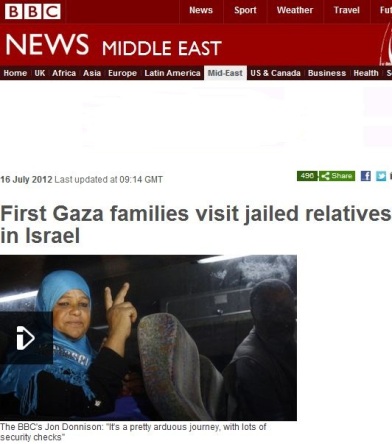BBC celebrates with Palestinian prisoners: Reunited, and it feels SO good!
The BBC cheerfully announced that dogged defenders of convicted terrorists’ rights were overwhelmed with “indescribable excitement” at the news that Palestinian families from Gaza would be allowed to visit their jailed relatives in Israel for the first time in five years.
The International Committee of the Red Cross (ICRC), having coordinated the visits, expressed its wish that “…visits by residents of Gaza will [soon] resume in full.”
Beyond the narrative woven of lonesome prisoners being able to see their wives and children after years of separation, there lies a fundamental and uncomfortable truth: while some Palestinians are in jail for relatively minor infractions, others areincarcerated for terrorism-related crimes, including murder.
Israel agreed to the move in May, as part of a deal to end a mass hunger strike by the “newest heroes of the Palestinian cause” - security prisoners including members of Islamic Jihad and other terrorist groups whose entire raison d’etre is to kill Israeli men, women and children in the name of Palestinian liberation.
As part of the deal that was struck, prisoner leaders committed not to engage in militant activity inside jail and to refrain from future hunger strikes.
The BBC’s coverage of this heart wrenching story of fleeting family reunification makes no mention of the murderous acts, mostly against unarmed civilians, that landed many of these Palestinians in Israel’s Ramon prison.
For all its brevity, the BBC news blurb is replete with examples of shoddy research and glaring inaccuracies. Good, credible reportage is based on the conveying of historical context. While the BBC states cryptically that family visits were halted in 2007 “… after the militant Islamist group Hamas came to power in Gaza,” the devil is in the details.
In fact, Israel banned family visits to prisoners from Gaza in 2007, a few months after Gazan terrorists kidnapped Israeli soldier Gilad Shalit, holding him captive until they exchanged him for over 1,000 Palestinian prisoners in 2011.
Still, why does Israel have to be so cruel to terror suspects? In some cases, Israel will even hold said freedom fighters in prison without trial for lengthy periods of time – surely an abuse of international human rights, no?
Israel’s strangeness among the family of nations is an unshakable belief that’s taken for fact by many an otherwise reputable international broadcasting organization. Yet it is worth noting that administrative detention – the arrest and detention of individuals by the state without trial, usually for security reasons – is used by a large number of countries including the United States and United Kingdom, which has maintained many forms of administrative detention over the years.
Administrative detention is often used in cases where the available evidence consists of information obtained by the security services and where a trial would reveal sensitive security information, such as the identities of informers or infiltrators.
Apparently, the BBC was under a tight deadline and failed to include in its coverage that the legal basis for Israel’s use of administrative detention is the British Mandate 1945 Law on Authority in States of Emergency.
In recent years, Israel’s prisons have become among the most closely scrutinized in the world, which is one reason why the government has allowed representatives of the Red Cross and other groups to inspect them regularly.
One Palestinian prisoner who was released in the first phase of the Gilad Shalit deal, Samer al-Issawi (a member of the Democratic Front for the Liberation of Palestine) has spoken in detail about how he was treated during his incarceration in five different Israeli prisons.
According to Issawi, most prisoners are held eight to a cell that is approximately 25 feet by 15 feet. Each cell has its own shower, bathroom, kitchenette and a TV that receives 12 channels, including Israeli channels and several Arabic-language channels, among them Palestinian TV.
Furthermore, prisoners are allowed into a courtyard to exercise for an hour. For two hours each morning and each afternoon, prisoners may leave their cells to visit prisoners in other cell blocks.
On Fridays, Muslim prisoners may pray together in the prison courtyard. A prisoner serves as the imam, or prayer leader.
As for medical care, the prisoners, according to Issawi, have doctors at the prisonand, when necessary, are treated at Israeli hospitals.
And since Israel’s treatment of its Palestinian prisoners is such an ongoing topic of fascination for pro-Palestinian human rights groups, where is the international outcry in response to the treatment of Israelis held captive by Palestinians?
Had the BBC spent a bit more time on old-fashioned research and less on a “total identification with the goals and methods of the Palestinian terror groups”, it may have gotten the facts straight.
http://cifwatch.com/2012/07/19/bbc-celebrates-with-palestinian-prisoners-reunited-and-it-feels-so-good/

No comments:
Post a Comment